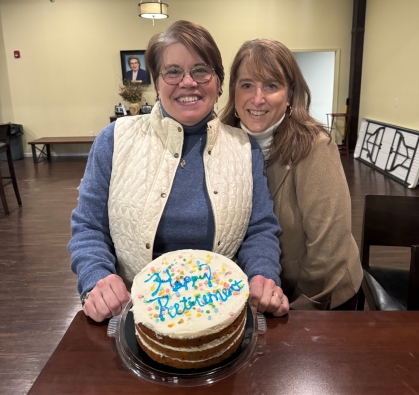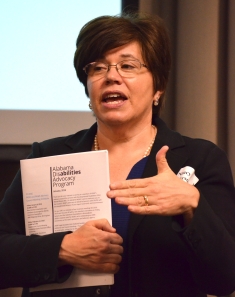Alumnae Continue Legacy of Leadership at ADAP

At the end of December 2024, Nancy E. Anderson ’99 retired as associate director of the Alabama Disability Advocacy Program (ADAP). Housed at The University of Alabama, ADAP is part of the congressionally mandated and federally funded nationwide system of protection and advocacy (P&A) organizations whose mission is to protect, promote, and expand the civil rights of individuals with disabilities. ADAP and its sister agencies across the country are members of the National Disability Rights Network (NDRN).
Leading up to her retirement, Anderson had served as the agency’s interim executive director for several months while the agency searched for a permanent director – which it found in Rutgers Law School alumna Shannon M. Shelley-Tremblay ’02. “I’m honored to follow in Nancy’s footsteps,” Shelley-Tremblay says. “She has been a rock for this organization—a remarkable lawyer and advocate who has cultivated meaningful relationships across Alabama to benefit the people we serve.”
When Anderson retired at the end of last year, she had the distinction of having held multiple key positions at ADAP, from a 3L law clerk in the late 1990s to nearly every leadership role, including director (interim), associate director, and legal director. Over the years, she has been at the forefront of representing young clients on critical issues such as healthcare access, special education, and juvenile justice. Her work has included systemic reform efforts, direct representation, and outreach initiatives that have left a lasting impact on Alabama's disability community.

Anderson’s legacy, however, is most profoundly defined by her tireless advocacy on behalf of children and families, particularly in the areas of special education and mental health services. Known for her tenacity and problem-solving skills, Anderson has earned widespread respect for finding solutions in the face of seemingly insurmountable challenges.
“Nancy led with clear eyes and directness—qualities that reflect her New Jersey roots,” Shelley-Tremblay says.” “She approached challenges with a smile and determination, and I’m eager to honor her legacy while advancing ADAP into its next chapter.”
Shelley-Tremblay joins ADAP with a wealth of nonprofit and higher education experience as an advocate for civil rights, inclusion, poverty alleviation, and access to justice. Notably, she founded the Office of Community Engagement at the University of South Alabama, served as civil rights advocate for the Independent Living Center of Mobile, and managed programs for the university’s Center for Healthy Communities (CHC) and Youth Violence Prevention initiatives. Additionally, she launched Veterans Recovery Resources, a nonprofit organization providing healthcare and community integration services for veterans.
“I have always had a deep and abiding passion for civil rights, justice, and ensuring equal access to education, healthcare, and all the things that make us great as a country,” she says. “It’s why I went to law school and it’s why I chose Rutgers, where I knew public interest work was a priority.”

As she steps into her role at ADAP, Shelley-Tremblay aims to build on ADAP’s longstanding work on behalf of, and in partnership with, Alabamians with disabilities. Her plans include hiring more attorneys and interns, expanding ADAP’s reach, and strengthening its network. “The work ADAP does is among the most important litigation in the country, often in partnership with organizations like the Southern Poverty Law Center, the Center for Public Representation, and the ACLU,” Shelley-Tremblay says. “The NDRN is a small but mighty force of advocates across 50 states and seven territories, and I am thrilled to be a part of it.”